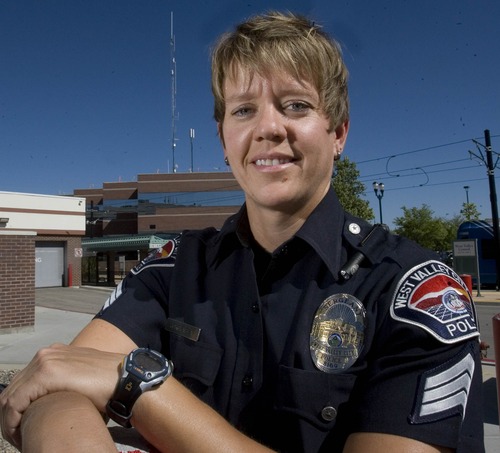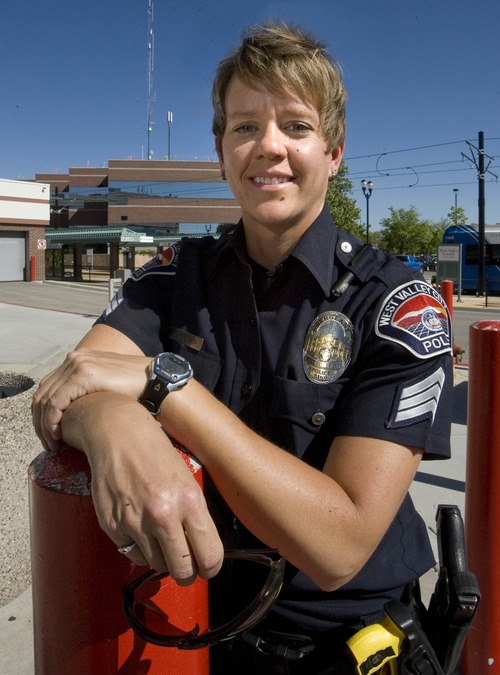This is an archived article that was published on sltrib.com in 2013, and information in the article may be outdated. It is provided only for personal research purposes and may not be reprinted.
He told Salt Lake City Police Detective Kevin Stayner he had been robbed in Liberty Park.
Stayner had a feeling the man had actually been jumped, targeted for being gay. Though he couldn't get him to say so, the openly gay detective was sensitive to the victim's sexual orientation.
"I'm not having any judgment toward him," Stayner said. In the end, Stayner felt the man was more forthcoming with him than he would have been with someone else.
It's progress. Officers know there is wariness among the lesbian, gay, bisexual and transgender (LGBT) community to talk to police, fearing they'll be mistreated or outed. For instance, a 2010 survey by the Utah Pride Center showed only 34 percent of respondents believe they are protected against discrimination based on sexual orientation when reporting a domestic-violence dispute.
But a loose-knit group of civilians and police, both LGBT and straight, is trying to change that.
The Public Safety Pride Alliance, affiliated with the Utah Pride Center, has worked for more than a decade to improve understanding between officers and the LGBT community. The alliance helps LGBT people understand police procedures and offers police, fire and medical responders insight on how best to handle LGBT victims and witnesses.
A year ago, three gay men were attacked in a matter of two weeks in northern Utah.
On Aug. 26, a group of men broke into a gay man's Salt Lake City apartment and beat up his boyfriend. The same day, four men assaulted a gay man as he left a club a few blocks away. The suspects beat him and stomped the side of his head, shattering his cheekbone and breaking his jaw.
Then, on Sept. 8, a gay man was on the job at an American Fork hair salon when he said several people beat him up and yelled anti-gay slurs at him.
Violent hate crimes galvanize people and bring the alliance into the spotlight, but as public attention moves on, so can event turnout and awareness. The alliance wants to get the word out that it is here and available, said West Valley City Police Sgt. Julie Jorgensen, a member of the alliance.
The alliance convenes on the second Tuesday of every month at the Utah Pride Center, where it invites people to field questions and concerns.
When any crime against a member of the LGBT community occurs, it hurts an investigation when no one tells the police or talks to them.
The alliance hopes that its training classes, town halls, literature and outreach at community events helps reach both sides of the equation.
Brandie Balken, executive director of Equality Utah, said she's "absolutely" seen improvement.
"It's starting to get a little better,"Jorgensen said.
There's still room for growth on the law enforcement side as well.
More than 12 Salt Lake and Davis County agencies have some representative in the alliance. A Weber County agency used to, but that officer retired and was never replaced. The alliance wants to expand but has had trouble reaching out to some rural agencies.
A while back, the alliance was organizing a hate-crimes class but had to cancel because only one person, a civilian, signed up, Jorgensen said.
The alliance helped launch a successful Salt Lake City program, Healthy Self-Expressions, that steered people caught having sex in public places toward counseling, not jail. If the violators did not repeat the offense for a year — the vast majority did not — the charges were dropped.
"The idea behind this was to help [build] congruence between the two lives that they're leading," said Kyle Jones, a now-retired member of SLCPD who was inspired to help found the alliance after his son came out to him.
The alliance tried to pitch the program to other communities with similar public sex issues, he said, but they weren't responsive.
But the alliance will continue extending its hand. The group is scheduled to meet with other agencies later this year to offer education, training and encourage them to get involved, as well as how to start their own programs.
The younger LGBT generation can be hard to reach as well, Jorgensen said. The alliance tries to bridge that gap with a push during the Utah Pride Festival and by providing security at Queer Prom.
On the flip side, the newer generation of officers is among the most welcoming of LGBT co-workers, Jones said.
Openly gay officers would not have been met with the same acceptance 20 years ago, but many LGBT officers now serve openly at several Utah agencies, Jones said. They simply don't care. When Strayner came out, it was a nonissue.
"They don't care what your sexual [orientation] is," Jones said, "just the quality of your character and quality of your work."
Twitter: @mikeypanda





